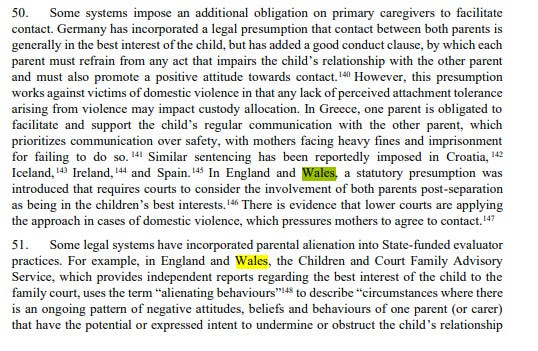
Richard Luthmann and I were back for the eighteenth episode of The Unknown. ‘
After some current events, we talked about some new civil RICO lawsuits against courts, an update in Paul Boyne’s case, and a notorious doxxer has issued a subpoena to Rick.
I recently found several stories from around the world which show a trend in the ideological battle of over parental alienation.
First, we go to the Canadian legislature, where Canadian Senator Marilou McPhedran wants the term banned.
Quoting from a UN rapporteur, Senator McPhedran stated, “parental alienation is a discredited, unscientific, pseudo concept, used in family law proceedings by abusers as a tool to continue their abuse and coercion…to undermine and discredit allegations of domestic violence made by mothers predominantly.”
Senator McPhedran sounded a lot like me.
Next, there was an article from European Times, which looked at a study which found throughout Europe protective mothers had their allegations of abuse discredited by the use of parental alienation.
Within the labyrinth of family courts, a chilling paradox persists: mothers, who should be lauded for their courage in denouncing the abuse suffered by their children, often find themselves exposed to paroxysmal institutional violence. These women, often referred to as “protective mothers,” see their role as protective parents distorted, and their rights restricted by institutions meant to ensure justice and safety. But how can processes designed to protect sometimes reproduce the very mechanisms of abuse they are supposed to combat—or even generate new ones?
In France, according to the Independent Commission on Incest and Sexual Violence Against Children (CIIVISE), nearly 160,000 children fall victim to sexual violence every year. Among them, a staggering majority (81%) endure abuse within their immediate family. This already appalling reality becomes even more troubling when illuminated by the testimonies of protective mothers. In their attempts to report these crimes and ensure their children’s safety, these women encounter a judicial system where 76% of complaints are dismissed without further action.
An emblematic example is the case of Priscilla Majani, who was convicted of “child abduction” after trying to protect her daughter from a father accused of sexual abuse. Her story highlights the tragic impasse faced by protective mothers: either comply with court decisions they deem unsafe for their children or directly conflict with the law.
…
The use of Parental Alienation Syndrome (PAS), although scientifically discredited by numerous international institutions, remains a frequent tool in family courts to undermine protective mothers. Developed by Richard Gardner in the 1980s without empirical validation, PAS rests on assumptions that obscure dynamics of power and violence in conflictual separations. It is often invoked to characterize mothers’ protective behaviors as attempts to manipulate their children against the father.
Similarly, the concept of loyalty conflict, as defined by De Becker, is used to pathologize the relationship between a child and their protective parent, particularly in cases of intrafamilial violence. This notion, rooted in systemic theories of the 1970s, lacks rigorous empirical validation. It tends to reduce the child to a passive victim, ignoring their agency and adaptive strategies in hostile environments. This theory shifts the focus from the origins of the mother’s behavior—the violence endured—to interpretations that hold her responsible for familial dysfunction. Consequently, it stigmatizes victims as instigators of relational problems, justifying judicial decisions that often lead to unjustified separations between abused parents and their children. The psychological well-being of both the child and the protective parent, already weakened by violence, is frequently disregarded.
The conclusions of the article sounded a lot like the conclusions of Senator McPhedran.
Finally, in England and Wales, a new directive instructs judges to emphasize allegations of domestic violence while deemphasizing allegations of parental alienation.
Family courts in England and Wales should give more weight to allegations of domestic abuse than to claims of "parental alienation", according to new guidance.
When parents have separated, and are arguing over their children, they turn to the family court. In these private law children cases claim and counter-claim are common.
One parent, usually the mother, may accuse the other parent of abuse. The father may counter that she has manipulated the children against him - termed parental alienation.
How the court responds can have lifelong consequences for the family, as the judge has to decide whom the children live with, and what time they spend with the other parent.
There is a concerted global effort to remove parental alienation from the family court lexicon. This effort started in earnest in 2023 when the United Nations (UN) put out a report entitled: Custody, violence against women and violence against children - Report of the Special Rapporteur on violence against women and girls, its causes and consequences
The report found that there is a global parental alienation industry which, like Senator McPhedran noted, seeks to make money by diminishing reports of domestic abuse made primarily by mothers and claims that these reports are false and the outgrowth of parental alienation. Below is part of the report.
I have highlighted how five states have banned reunification therapy in the US. Reunification therapy is a key component in the so-called treatment of parental alienation. Italy banned the use of the term parental alienation in 2022. Now, there is movement in Canada and England as well. There is global momentum to make the term parental alienation disappear entirely.




